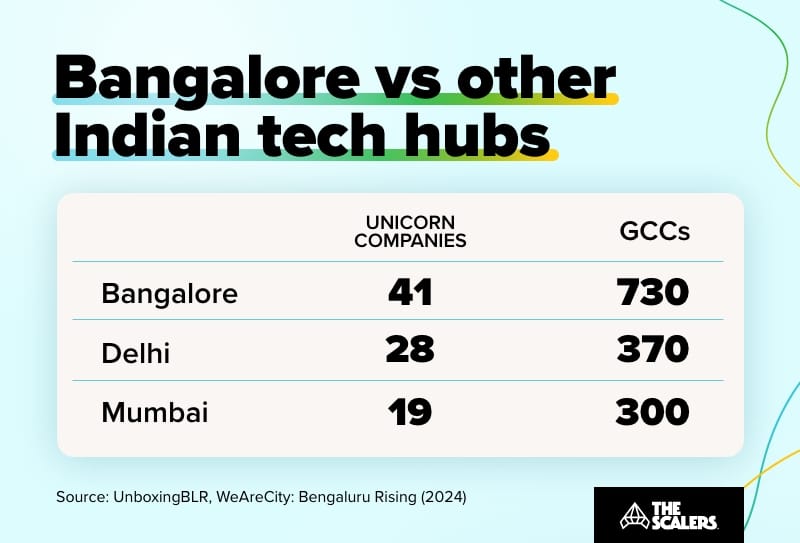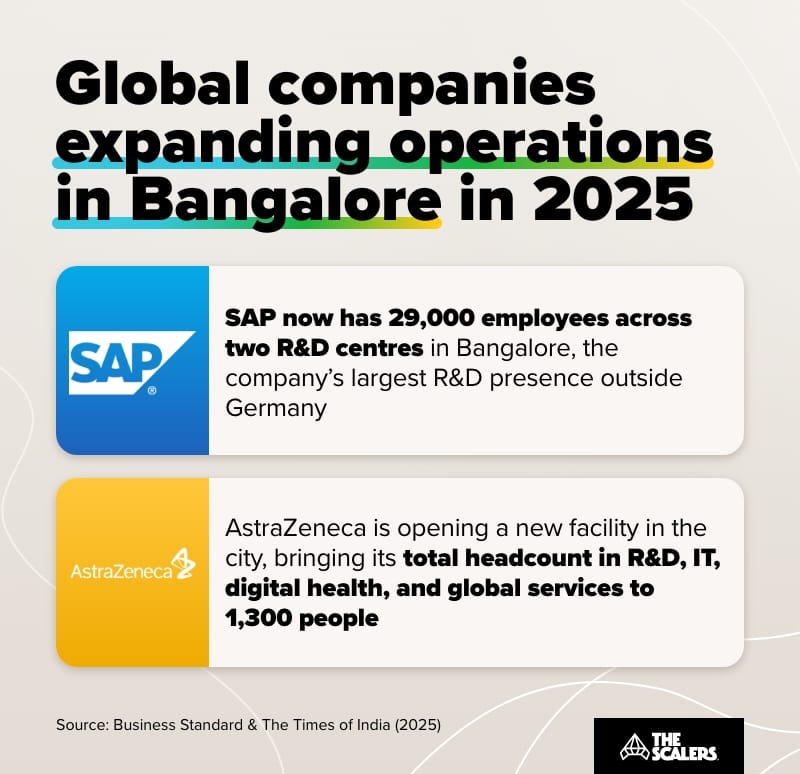Who would’ve thought that the small, modest city founded by Kempe Gowda in 1537 would one day become India’s fastest-growing tech hub?
Under heavy monsoon skies and the buzz of endless traffic, Bangalore hums with code and ambition. What was once a sleepy city of parks and public offices is now a magnet for startups and global tech giants chasing the next big thing.
They call it the Silicon Valley of India. Here’s how it got there, and what the tech scene looks like today.
Why is Bangalore known as the Silicon Valley of India?
Bangalore is known as the Silicon Valley of India for its thriving startup ecosystem, its massive software engineering talent pool, and the presence of tech giants like Google and Amazon, which have established R&D centres in the city.
The combination of these factors has created an atmosphere of innovation driven by ambitious engineers and entrepreneurs. It’s unlike any other metro area in India… or the entire continent. Some even consider Bangalore the Silicon Valley of Asia, ahead of cities like Shenzhen, China.
Here are some hard stats and numbers that explain why Bangalore has earned such a nickname:
- A historical leader in IT services, Bangalore is home to 6 of the top 20 IT companies in India.
- It has over 2 million software developers and produces around 90,000 engineering graduates every year.
- More than 400 global companies, including Apple, Meta, and Microsoft, have set up R&D centres here.
- Ranked 10th best city in the world in the Global Startup Ecosystem Index 2025, Bangalore continues to attract innovation and investment.
- Southern states account for nearly 60% of India’s total IT exports, with Bangalore alone contributing $64 billion.
And, as the infographic below shows, the city outperforms other Indian tech hubs across key indicators like unicorn count and the number of Global Capability Centres (GCCs).

How did Bangalore become a global tech hub?
Bangalore wasn’t always the IT metropolis it is today, but it has been connected to the science and technology sectors since the mid-20th century. Let’s take a walk down memory lane…
Early foundations: Public sector and education
Before Bangalore became India’s startup capital, it was a center for science and aerospace. In the 1960s and ’70s, government-led institutions like ISRO (Indian Space Research Organisation) and HAL (Hindustan Aeronautics Limited) helped shape the city’s early identity as a hub for engineers, researchers, and scientists.
Alongside these, academic powerhouses like the Indian Institute of Science (IISc) and Indian Institute of Management Bangalore (IIMB) created a pipeline of highly skilled graduates.
The 1980s–2000s: The making of an IT capital
In 1984, India introduced new computer and software policies that liberalised imports and exports. That single shift opened the floodgates. Tech firms like Wipro and Infosys began hiring software engineers and exporting services.
Then came the global players.
In 1985, Texas Instruments Inc. became the first multinational company to set up a development center in Bangalore. Throughout the 1990s, more organisations followed. They were drawn by three things: a deep talent pool, lower costs, and a growing tech ecosystem.
The Indian government supported the growing software industry by setting up Software Technology Parks of India (STPI) in the early ’90s. Its Bangalore centre, the first in the country, gave tech companies tax breaks and the infrastructure to scale and export software globally.

The 2010s: From back office to an R&D hotspot
By the 2010s, Bangalore had transformed from a centre for outsourced operations into a hub of innovation and entrepreneurship. The city’s startup scene exploded, with the rise of companies like Flipkart, Ola, Swiggy, and Razorpay. Funding poured in, and engineering graduates began choosing startups over traditional corporate jobs. The dream shifted, from working at Google to building the next big tech giant.
At the same time, global companies deepened their roots in Bangalore. Microsoft, Amazon, IBM, and Cisco opened R&D and innovation centres, moving beyond back-office work into product development.
Post-2020: Scaling through crisis and into the future
The COVID-19 pandemic’s impact on the popularity of distributed teams made offshoring to Bangalore even more attractive to global firms, as the city was already well-suited for it. Companies accelerated hiring, scaled teams faster, and doubled down on their Indian operations.
By 2022, Bangalore had raised $10.8 billion in startup funding, more than any other city in India. The city reaffirmed its status as India’s startup capital in the first half of 2025, attracting $3.9 billion across 143 deals, accounting for 40% of the country’s total startup funding.
Today, the city is home to 2,467 startups, making up 23% of all startups in India, with approximately 25 startups per 100,000 people.
Global companies continue to expand here, not just to cut costs, but also to look for highly skilled talent versed in both in-demand and emerging technologies. Bangalore is still young, dynamic, and growing.

What are some of the top IT companies and startups in Bangalore?
Bangalore is home to hundreds of global tech giants and innovative startups, including Fortune Global 500 companies and several unicorns.
Top IT and Fortune Global 500 companies in Bangalore
- Amazon. Maintains multiple development centres in the city, employing thousands locally and continuing to recruit top engineering talent.
- IBM. Operates one of its largest Indian R&D centres in Bangalore. Recently announced the launch of an Agentic AI Innovation Center, further expanding its R&D footprint.
- Microsoft. Its Bangalore research lab is the third Microsoft Research facility outside the US and one of the company’s largest globally. In 2025, it celebrated 20 years in the city.
- Ericsson. Recently announced plans to begin ASIC (application-specific integrated circuit) development in Bangalore, with more than 150 new R&D roles being added.
- Cisco. Runs a prominent design and engineering facility here, focusing on networking systems and cybersecurity solutions.
Top startups in Bangalore
- Flipkart. India’s homegrown ecommerce giant employing thousands across product, logistics, and tech teams.
- BYJU’S. Major EdTech unicorn with large engineering and content operations driving its growth.
- Razorpay. FinTech leader that has recently expanded its engineering team to scale payments and lending products.
- Swiggy. Foodtech and quick-commerce platform steadily growing its tech and operations workforce.
- Unacademy. Online learning startup actively scaling its engineering and content teams across new verticals.
How can you build a world-class tech team in the Silicon Valley of India?
In this article, we’ve just talked about the big names, but it’s not only these companies that are extending their tech teams in Bangalore. Small and mid-sized organisations are also leveraging the massive talent pool the city has to offer.
An excellent example of this is Preqin. This UK FinTech, a leader in its space, scaled to a 450+ person R&D centre in Bangalore in five years, after starting with just a team of four engineers.
And they did it with a unique offshore model that has helped multiple organisations build, extend, and scale teams with elite Indian talent, pivotal to launching flagship products and accelerating software delivery.
We wanted to have our own team and make it very ‘Preqin’ and we wouldn’t have been able to build that team so quickly without The Scalers. They handled all of the hassles so we could spend our time building quality software and collecting quality data. And we wouldn’t have grown as Preqin without the team in India.
At The Scalers, we’ve built 130+ world-class tech teams since 2014 in Bangalore for companies that have achieved success like Preqin.
Do you want to know how we can help you set up a dedicated development team with the top 2% of the city’s engineering talent? Fill out this form, tell us your unique needs, and one of our senior executives will contact you promptly.
In summary
Bangalore’s transformation into India’s Silicon Valley didn’t happen overnight: it’s the result of decades of public investment and a thriving entrepreneurial mindset. Now, with AI and deep tech gaining momentum, the city is entering a new phase of growth.
And its journey is far from over.
Key takeaways:
-
1
Bangalore is home to over 2 million software developers and contributes $64 billion in IT exports, earning it the nickname ‘Silicon Valley of India’.
-
2
From government-led institutions in the 1960s to global tech hubs today, Bangalore’s rise as a tech powerhouse spans over six decades.
-
3
Tech giants like Amazon, IBM, and Microsoft continue to deepen their R&D presence in Bangalore, driving innovation across sectors.
-
4
Bangalore leads India’s startup ecosystem, hosting 2,467 startups and attracting 40% of the country’s total startup funding in H1 2025.
-
5
Companies like Preqin have successfully built world-class development teams in Bangalore with The Scalers’ proven offshore model.
Thank you for reading this far, and see you in the next one!
FAQs
With the right offshore partner, you can set up and onboard a dedicated team in as little as 4 to 6 weeks, depending on your hiring needs and tech stack.
Yes. Offshoring gives smaller and mid-sized businesses access to world-class talent, faster delivery, and cost efficiency.
With a dense concentration of AI startups, top tech talent, and R&D centres from global leaders like IBM, Microsoft, and Google, Bangalore has naturally emerged as the country’s leading hub for innovation in AI and LLM.
Build Your Team,
Not Just a Contract
With The Scalers’ offshore dedicated development team, you get engineers who join your workflow for the long run. Grow steadily, stay flexible, and work with people who care about the product as much as you do.







